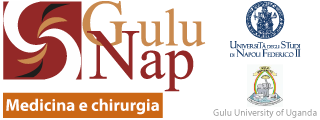Classrooms and equipment

I University Pole: GULU REGIONAL HOSPITAL
A new structure made of four buildings – completely dedicated to teaching, has been built on the old Gulu Hospital to include:
1. A classroom with Internet access and PC projector seating 80;
2. A multimedia classroom with 25 workstations, Internet satellite access;
3. A dissection laboratory with 25 steel tables and 10 cadavers in formalin;
4. A Learning Laboratory for Histology and Human Biology;
5. A Library, Dean’s Offices, administration office, logistics office, a Faculty Board Room for teachers.
II University Pole: ST. MARY’s HOSPITAL of LACOR – 6 km from Gulu
The following teaching facilities have been inaugurated:
- An Assembly Hall of 500 places and two Classrooms with 60 seats;
- A completely equipped Library, containing medical books and reviews;
- A multimedia room, to be equipped with 25 PCs by the Province of Naples, Italy;
- A learning laboratory for Biochemistry and Microbiology (to be completed)
- A room for Epidemiology and Biostatistics (to be completed);
- A secretariat for students and teachers.
Human resources
Teachers

The Faculty is presently made up of 34 Ugandan members: Dean, the Associate Dean, two Deputy Deans, 7 Directors of Departments (Public Health, Anatomy & Physiology, Biochemistry, Pharmacology, Internal Medicine, Surgery, Child Health, Reproduction), 5 full time Teachers and 7 specialised Lecturers, 9 Teaching Assistant, 1 Anatomy Technician and 4 Laboratory Technicians.
 All are quite young (28-45), graduated at Makerere University in Kampala , with English education and enthusiasm for the new activity.
All are quite young (28-45), graduated at Makerere University in Kampala , with English education and enthusiasm for the new activity.
The majority have little teaching experience. Ugandan Professors come from other national Universities and Health Institutions: among them medical personnel from the Gulu Regional Hospital , from the St. Mary’s Hospital of Lacor and other hospitals.
They have teaching qualification and join the didactic programme on a contract basis. ‘Honorary Lecturers’ will be recruited among the personnel of the joining hospitals.

The Italian visiting professors from the Federico II University of Naples are a fundamental resource: in collaboration with their Ugandan colleagues, they carry out a compact course of about 4 weeks, in accordance with the plan of studies approved by the Faculty.
The number of 4-weeks modules is programmed on a three-year basis, and increase by five each year (five the first year, ten the second, fifteen the third).
Different partners in addition to the promoters of the project – such as OMS, ISS, other Italian Universities , will provide Sanitary and public health competencies through specific co-operation agreements.
Tutors
Tutors will be recruited on a contract basis from the University of Gulu , among full-time personnel of Gulu Hospital , St. Mary’s Hospital of Lacor and Gulu Independent Hospital , with a small expense allowance for the extra work. It is foreseen to employ about 10 tutors per each semester:
. Senior and Clinical Medical Officers of the teaching hospitals network voluntary at the University
. Biologists and paramedical staff of high level
. Students of the 5 th year and interns
Financial Resources

The project makes use of a limited initial budget, only sufficient to operate the main activities of the start-up phase and to initiate others to be held and developed. The University of Gulu will receive the sum of US$ 515.000 by the Ugandan Treasury, while US$ 275.000 will be transferred on the bank account of the University of Naples .
One of priority objectives is to promote adhesion of new partners – either public or private, who could perform a role in the several sub-projects and confer additional financial resources.
Other possible financial sources :
- Ugandan Government
- Italian Co-operation
- European Union
- International Agencies
- Local Bodies
- Italian and international enterprises
- Non governmental organisations
- Private philanthropic Associations
More funds could be allocated by the Municipality of Naples , Province of Naples , Region Campania , who the Federico II University have involved in the project through programme agreements.
Control processes and strict procedures in granting funds must be set out in agreement between the Italian and Ugandan institutional bodies to guarantee correct and effective use of financial resources.

